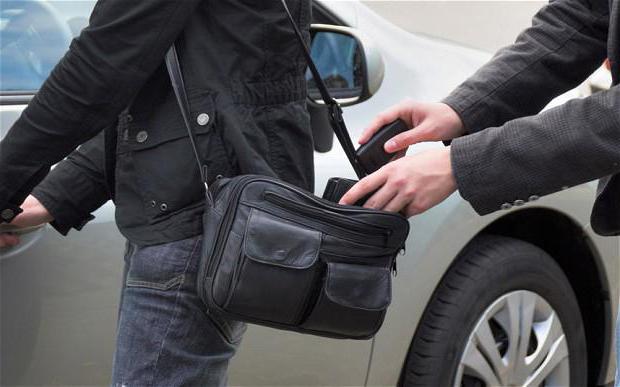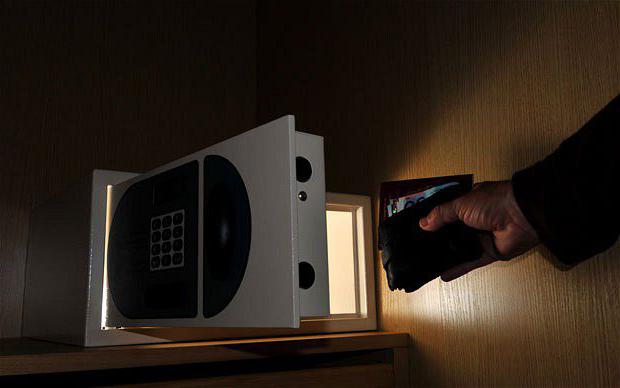Theft is qualified under the Criminal Code in Art. 158. This act covers attacks on various forms of ownership. Let us consider this crime in more detail.

Characteristic
In the legal sense, theft is different from embezzlement, robbery, fraud, robbery. All these attacks are considered as types of theft, but have their own characteristics. A synonym for theft is the concept of "theft." Earlier in Russian, this word meant a crime against the authorities. For example, such definitions are known as "Tushinsky thief", "Pugachev - a thief and an impostor." The person who hunted thefts was called "thief", and his actions - "thief".
Section 158
Theft is regarded as the secret theft of material assets (property) belonging to other persons. For such an act Art. 158 h. 1 establishes as punishment:
- Cash collection of up to 80 thousand rubles. or equal to salary / other income up to six months.
- Up to 360 hours obligatory work.
- Up to 2 years of freedom restriction.
- Up to 1 year of corrective labor.
- 4 months arrest.
- Up to 2 years of forced labor.
- Up to 2 years in prison.
Part two
Art. 158 h. 2 provides for punishment for secret theft committed:
- Pre-agreed group of persons.
- With unlawful entry into a room or other storage.
- With causing substantial harm to the citizen.
- From a bag or other hand luggage, from clothes that were with the victim.
Provided for in Art. 158 of the Criminal Code, part 2 establishes the following sanctions:
- Forced work up to 5 liters. Additionally, restriction of freedom for a period of up to 1 year may be imputed.
- Cash collection of up to 200 thousand rubles. or equal to the salary / other income of the offender for 1.5 g.
- Up to 480 hours of compulsory work.
- Up to 5 years in prison. Additionally, the court may impose a restriction of liberty up to 12 months.
- Up to 2 years of corrective labor.

Qualifying Attributes
They are established in the third part of Art. 158 of the Criminal Code. It defines the punishment for theft, which was committed:
- With illegal entry into housing.
- From an oil product pipeline, an oil and gas pipeline.
- In large size.
It is worth noting that the latter symptom is also characteristic of other norms of the Criminal Code. Art. 158 h. 3 for the above acts sets a punishment in the form of:
- Cash recovery from 100 to 500 thousand rubles. or equal to s / n or other income for 1-3 g.
- Up to 5 years forced labor. In addition, a judge may impose a restriction of freedom up to 18 months.
- Up to 6 years in prison. In addition, a guilty person may be fined up to 80 thousand rubles. or in the amount of salary or other income for six months, as well as the restriction of freedom for a period of up to 18 months.
Aggravating circumstances
They are provided for in the fourth part of Art. 158 of the Criminal Code. Aggravating circumstances include the commission of secret theft of valuables by an organized group and in an amount recognized as especially large. For these acts Art. 158 of the Criminal Code establishes up to 10 years in prison. In addition, a subject may be charged with a monetary penalty of up to one million rubles or equal to the amount of s / n (other income) for a period of up to 5 years, as well as a restriction of freedom up to 2 years. 
Notes
Theft acts as the main symptom corpus delicti according to Art. 158. In its legislation, the Russian Federation recognizes as it was a gratuitous unlawful seizure or circulation of tangible property, owned by other persons, for the benefit of the entity that committed them, or in the interests of other citizens. To be held accountable, these actions must be detrimental to the owner of the property. Material damage is determined in accordance with the property status of the citizen.However, it should be more than 2.5 thousand rubles.
As the premises should be understood constructions and structures that are designed for temporary stay of people or the placement of property for industrial or other purposes. Moreover, their form of ownership does not matter. The storage referred to in part 2 of article 158 of the Criminal Code, there is an economic type of premises, isolated from a residential building, pipelines, as well as areas and other structures used for temporary or permanent maintenance of material assets. When qualifying an act, their form of ownership does not matter. Large is recognized as the size equal to the value of the property more than 250 thousand rubles, especially large - more than a million.

Specificity
Definition of theft according to Art. 158 of the Criminal Code contains an indication that the crime acts as a form of theft. This means that the signs of the latter are present in the act. The way the theft is committed is characterized as secret. This definition corresponds to the generally accepted concept of theft. Secret is considered such a seizure of material values, which is carried out without the consent and knowledge of the owner or entity in whose jurisdiction they are. As a rule, such an act goes unnoticed by outsiders.
For example, secret theft takes place during a house theft. A crime can be committed in the presence of the owner of the property if the latter does not notice the actions of the attacker. Theft is considered the seizure of material assets from a person who does not perceive what is happening. For example, a subject who is sleeping is intoxicated, fainting. According to Art. 158, acts committed before the eyes of persons who are unable to assess the wrongfulness of the guilty person’s behavior due to mental illness or young age are qualified. Theft will be considered secret also if it was committed:
- In the presence of those subjects from whom the attacker did not expect opposition (for example, his acquaintance or relative).
- A person who believed that he acted secretly, even if, objectively, his behavior was not. For example, the theft of a painting from a museum under the guise of removing it for restoration in the presence of visitors. In this case, the actions are performed openly, but the people who see them do not realize their illegality.

The distinction from robbery
An important sign of theft is that it is regarded as a non-violent form of theft. At the same time, it should be delimited from robbery. Secret removal of material assets may be accompanied by violence or violent acts precede the crime. In such cases, the act cannot be qualified under Art. 158. The culprit could act secretly, but he could be taken by surprise. Aware of this, the attacker continues the illegal seizure of material assets, but is already open, because he knows that he was noticed. His actions are regarded as robbery. An attacker can use violent actions to retain property immediately after the seizure. In this case, his behavior should be qualified in accordance with the nature of the violence used. It can be robbery or robbery.
Legal Implications for the Criminal
In addition to the non-violent method and secrecy, it is typical for theft that the attacker does not receive any rights to material values. He does not have the power to dispose of, manage, transport, store property that he illegally possessed. If the subject secretly seizes material values that are entrusted to him, then this act is not considered under Art. 158, and according to the norm 160, and acts as an assignment.
Types of Theft
They vary depending on the presence of qualifying features in the actions of the culprit. So, the following types of theft are distinguished:
- Qualified.
- Simple.
- Highly qualified.
The first is provided in part two.It established such signs as the commission of unlawful seizure:
- previously agreed upon by a group of subjects;
- with unlawful entry into a room (storage);
- with substantial damage to the victim;
- from hand luggage (bags, etc.), clothes that were with a citizen.

A crime will be deemed to be committed by a group of subjects previously agreed upon among themselves if it included 2 or more performers who had previously discussed and agreed on their participation in the crime. Under the preliminary should be understood the conspiracy that took place before the act. The duration of the gap between the agreement and the beginning of the crime does not matter. In the event that one performer has already begun the theft, and after a while another intruder has joined him, such an act does not contain the specified qualifying attribute.
Unlawful entry into a home
Housing thefts pose an increased danger to society. This is due both to the way they are committed and to the characteristics of the subjects of the crimes. Increased danger, but manifested to a lesser extent, occurs when committing illegal secret theft with penetration into a non-residential premises or storage. In both cases, the attacker encroaches on property in respect of which the owner has taken certain measures to ensure its safety.
Mandatory conditions
In order to impute to the guilty a qualifying attribute, expressed in illegal entry into the object, it is important to establish not only where the theft took place: from a dwelling, storage or non-residential premises. It is necessary to determine a special type of action. It is expressed in penetration to the place of maintenance of material values. According to the meaning of the article under discussion, this feature can only be said if it:
- It was committed illegally, that is, it was carried out contrary to the requirements and prohibitions or without the consent and knowledge of authorized entities.
- It is aimed at the theft of material assets belonging to other persons.
If an attacker had free access to a dwelling (as a temporary resident or a family member) or entered it legally (for work or as a guest), then the theft committed by him in such a situation does not give grounds for applying the indicated qualifying sign, since there is no illegality of penetration. All other elements that make up this circumstance are considered equally mandatory and should be analyzed in unity. 
Significant damage
This symptom is applied if the theft significantly affected the property condition of the victim. This circumstance implies not only the need to take into account the size of the stolen. The property condition of the victim is also taken into account. It, in turn, is estimated by the size of its income, the presence of dependents, social status and so on.
Highly qualified theft
Such is the secret unlawful seizure of property committed:
- An organized group of actors.
- In the amount considered especially large.
The definition of an organized group is given in Art. 35, part 3 of the Criminal Code. The concept of size, which is considered particularly large, is disclosed in a note to the rule in question.
Relapse
Often, attackers commit theft after they have already been held accountable. Repeated special relapse constitutes an increased social danger. A citizen who, despite having been repeatedly held accountable, nevertheless continues to commit crimes of the same kind, gains a special criminal experience. In this regard, repeated relapse is considered by law enforcement agencies as a sign of criminal professionalism. This, in turn, requires the expression of a tougher reaction from the public.
Conclusion
Theft is considered a fairly common type of crime. An encroachment on other people's property has been committed since ancient times. The main motive that drives criminals is self-interest. Attackers may commit theft for personal gain. Illegal seizure and circulation of other people's material assets may also be carried out in favor of other persons. In any case, damage is caused to the property owner by such actions. It is important to consider that the offender does not receive any legal rights to the stolen property. This means that the owner, despite the fact that material values are seized from him and are absent, remains their rightful owner. The object of the attack is property relations. The subject of theft can be a sane individual of 14 years.
